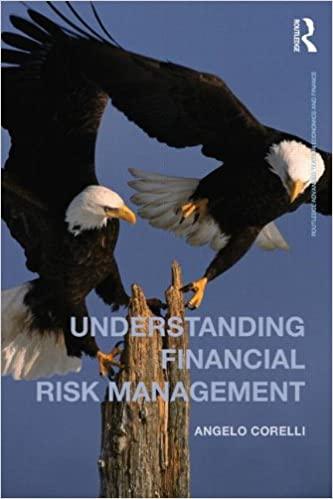Question
1. Earnings per Share, Price-Earnings Ratio, Dividend Yield The following information was taken from the financial statements of Tolbert Inc. for December 31 of the
1.
Earnings per Share, Price-Earnings Ratio, Dividend Yield
The following information was taken from the financial statements of Tolbert Inc. for December 31 of the current fiscal year:
| Common stock, $30 par value (no change during the year) | $9,300,000 |
| Preferred $5 stock, $100 par (no change during the year) | 4,000,000 |
The net income was $572,000 and the declared dividends on the common stock were $77,500 for the current year. The market price of the common stock is $9.00 per share.
For the common stock, determine (a) the earnings per share, (b) the price-earnings ratio, (c) the dividends per share, and (d) the dividend yield. If required, round your answers to two decimal places.
| a. Earnings per Share | $ | |
| b. Price-Earnings Ratio | ||
| c. Dividends per Share | $ | |
| d. Dividend Yield | % |
2.
Measures of liquidity, Solvency, and Profitability
The comparative financial statements of Marshall Inc. are as follows. The market price of Marshall common stock was $ 56 on December 31, 20Y2.
| Marshall Inc. | ||||||
| Comparative Retained Earnings Statement | ||||||
| For the Years Ended December 31, 20Y2 and 20Y1 | ||||||
| 20Y2 | 20Y1 | |||||
| Retained earnings, January 1 | $4,770,100 | $4,018,100 | ||||
| Net income | 1,050,800 | 823,000 | ||||
| Total | $5,820,900 | $4,841,100 | ||||
| Dividends: | ||||||
| On preferred stock | $14,000 | $14,000 | ||||
| On common stock | 57,000 | 57,000 | ||||
| Total dividends | $71,000 | $71,000 | ||||
| Retained earnings, December 31 | $5,749,900 | $4,770,100 | ||||
| Marshall Inc. | ||||
| Comparative Income Statement | ||||
| For the Years Ended December 31, 20Y2 and 20Y1 | ||||
| 20Y2 | 20Y1 | |||
| Sales | $5,861,535 | $5,400,550 | ||
| Cost of goods sold | 2,180,510 | 2,006,070 | ||
| Gross profit | $3,681,025 | $3,394,480 | ||
| Selling expenses | $1,178,190 | $1,459,740 | ||
| Administrative expenses | 1,003,645 | 857,310 | ||
| Total operating expenses | $2,181,835 | $2,317,050 | ||
| Income from operations | $1,499,190 | $1,077,430 | ||
| Other revenue | 78,910 | 68,770 | ||
| $1,578,100 | $1,146,200 | |||
| Other expense (interest) | 384,000 | 211,200 | ||
| Income before income tax | $1,194,100 | $935,000 | ||
| Income tax expense | 143,300 | 112,000 | ||
| Net income | $1,050,800 | $823,000 | ||
| Marshall Inc. | |||||||
| Comparative Balance Sheet | |||||||
| December 31, 20Y2 and 20Y1 | |||||||
| 20Y2 | 20Y1 | ||||||
| Assets | |||||||
| Current assets | |||||||
| Cash | $1,055,440 | $1,033,180 | |||||
| Marketable securities | 1,597,420 | 1,712,120 | |||||
| Accounts receivable (net) | 1,138,800 | 1,073,100 | |||||
| Inventories | 846,800 | 657,000 | |||||
| Prepaid expenses | 199,684 | 206,640 | |||||
| Total current assets | $4,838,144 | $4,682,040 | |||||
| Long-term investments | 4,083,676 | 1,985,569 | |||||
| Property, plant, and equipment (net) | 5,280,000 | 4,752,000 | |||||
| Total assets | $14,201,820 | $11,419,609 | |||||
| Liabilities | |||||||
| Current liabilities | $1,511,920 | $1,869,509 | |||||
| Long-term liabilities: | |||||||
| Mortgage note payable, 8% | $2,160,000 | $0 | |||||
| Bonds payable, 8% | 2,640,000 | 2,640,000 | |||||
| Total long-term liabilities | $4,800,000 | $2,640,000 | |||||
| Total liabilities | $6,311,920 | $4,509,509 | |||||
| Stockholders' Equity | |||||||
| Preferred $0.70 stock, $50 par | $1,000,000 | $1,000,000 | |||||
| Common stock, $10 par | 1,140,000 | 1,140,000 | |||||
| Retained earnings | 5,749,900 | 4,770,100 | |||||
| Total stockholders' equity | $7,889,900 | $6,910,100 | |||||
| Total liabilities and stockholders' equity | $14,201,820 | $11,419,609 | |||||
Required:
Determine the following measures for 20Y2, rounding to one decimal place, except for dollar amounts, which should be rounded to the nearest cent. Use the rounded answer of the requirement for subsequent requirement, if required. Assume 365 days a year.
| 1. Working capital | $ | |
| 2. Current ratio | ||
| 3. Quick ratio | ||
| 4. Accounts receivable turnover | ||
| 5. Number of days' sales in receivables | days | |
| 6. Inventory turnover | ||
| 7. Number of days' sales in inventory | days | |
| 8. Ratio of fixed assets to long-term liabilities | ||
| 9. Ratio of liabilities to stockholders' equity | ||
| 10. Times interest earned | ||
| 11. Asset turnover | ||
| 12. Return on total assets | % | |
| 13. Return on stockholders equity | % | |
| 14. Return on common stockholders equity | % | |
| 15. Earnings per share on common stock | $ | |
| 16. Price-earnings ratio | ||
| 17. Dividends per share of common stock | $ | |
| 18. Dividend yield | % |
Step by Step Solution
There are 3 Steps involved in it
Step: 1

Get Instant Access to Expert-Tailored Solutions
See step-by-step solutions with expert insights and AI powered tools for academic success
Step: 2

Step: 3

Ace Your Homework with AI
Get the answers you need in no time with our AI-driven, step-by-step assistance
Get Started


